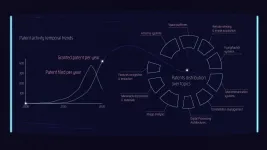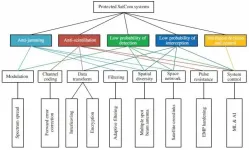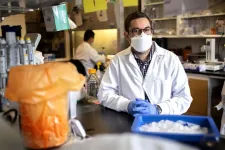(Press-News.org) Rather than levelling inequality, as the Great Depression did, the COVID-19 pandemic has exacerbated inequalities around the world allowing some wealthy investors to benefit from the crisis and make a fortune on the misfortune of others.
During March to December last year, U.S. billionaires increased their wealth by over one-third, to one trillion dollars, while millions of Americans faced deep financial hardship.
New research from Copenhagen Business School has examined how American "shadow banks"- which are less regulated and include private credit intermediaries such as private equity, venture capital, and hedge fund firms - have invested in ways that extract profit from the misfortunes of frontline workers, struggling companies, and distressed sectors.
The research focused on industry reports and news media coverage of the industry to track investments made by shadow banks during the crisis as well as their investments leading up to the crisis that affected the safety and security of frontline workers when the coronavirus hit.
"We found that while the most economically vulnerable have suffered the brunt of the pandemic's hardship, those with financial capital have profited from struggling and booming sectors alike. The work of shadow banks has contributed to growing economic and social inequality during the crisis," says lead author Megan Tobias Neely, and assistant professor in the Department of Organization, Copenhagen Business School.
The research is published in the American Behavioral Scientist journal.
Influence of shadow banks
While the general public is mostly unaware of shadow banking, this sector has been one of the fastest growing areas of finance since deregulation in the early 1980s. The research states that shadow banks have since played a central role in shaping how executives manage companies, often placing pressure on companies to downsize their workforces and cut wages and benefits for the sake of the shareholders.
"Private equity invests in private companies and often proactively influences how executives run the company," says co-author Donna Carmichael, PhD Researcher in Sociology at the London School of Economics and Political Science. "Venture capital, a type of private equity, invests in start up companies and provides guidance to entrepreneurs. Hedge funds invest in both public stock markets and private companies."
Healthcare, grocery, and distribution drivers have been some of the industries hardest hit even before this crisis. The authors cite Eileen Applebaum and Rosemary Batt's pivotal research to show how private equity has helped to create the conditions that made frontline workers vulnerable in the first place. These investors have targeted the U.S. healthcare industry with negative impact on hospitals, urgent care, and ambulances.
"Private equity firms often try to quickly turnover companies and invest less, or not at all, in new technology, workers' skills, quality improvements, and emergency equipment stockpiles like personal protective equipment. This has had the effect of increasing healthcare costs and overburdening underpaid healthcare staff," says Donna Carmichael.
"Women, especially women of colour, are disproportionately the workers who have been put at greatest risk during the pandemic. One-third of jobs held by women are 'essential,' and women compose 52% of frontline workers, including nine out of ten nurses and two-thirds of grocery store and pharmacy clerks. And so, the pandemic has made women 'essential and expendable' at the same time," adds Megan Tobias Neely.
COVID-19 crisis
The research underlines how, during the pandemic, shadow banks profited by investing in both booming sectors (such as health technologies and delivery services) and those that have struggled (including the airline, energy, and hospitality sectors). "Many companies in the latter sectors have seen their share prices sharply drop as their revenue plummets and investors sell off shares," says Donna Carmichael.
Short-selling occurs when an investor borrows a security and then sells it on the open market. If the price drops, they can then buy back the stock at the lower price and make a profit on the difference.
This is where shadow banks come in, to invest in turning those companies around or to short-sell (that is, bet against) the stock. "This is what hedge funds did that sparked the recent 'GameStop Rebellion. An example of short-selling during the crisis is how one hedge fund manager made a $1.3 billion profit by shorting shopping mall stocks, knowing they'd be hit hard by covid shutdowns," says Megan Tobias Neely.
"It can be seen as a riskier investment, and you can also lose money, but it is less regulated than other investment firms because the US Securities and Exchange Commission views these wealthy and institutional investors as less in need of protection. The climate of laissez-fair economics, the notion that markets will self-regulate and should be deregulated, has allowed shadow banks to thrive," adds Neely.
Moving forward
The research hopes to raise awareness of how the everyday work being done in financial services can have adverse consequences for working conditions and inequality. The ramifications are often unintentional.
"The people working in these industries understand their work as making companies more efficient and providing savings for people to retire and for institutions like university endowments and sovereign wealth funds (the investments of governments)," adds Megan Tobias Neely.
This research has important takeaways for public policy to address hardship and inequality among average workers during and after the crisis. Tax and regulatory reforms are a possible avenue for change to address these pressing social issues.
"Another way forward is democratising corporate decision-making among workers and improving representation of workers, consumers, and communities on corporate boards. Even though many have called to ´Build Back Better´, the prospects for a more equal and equitable future is still far away,"concludes Donna Carmichael.
INFORMATION:
People who have experienced childhood trauma get a more pleasurable "high" from morphine, new research suggests.
University of Exeter scientists compared the effects of morphine on 52 healthy people - 27 with a history of childhood abuse and neglect, and 25 who reported no such experiences in childhood.
Those with childhood trauma liked morphine (an opioid drug) more, felt more euphoric and had a stronger desire for another dose.
Those with no childhood trauma were more likely to dislike the effects and feel dizzy or nauseous.
"There are high rates of childhood trauma in people with addictions. Our findings ...
Warm mix asphalt (WMA) is gaining attention in the asphalt industry as an eco-friendly and sustainable technology. WMA reduces energy consumption while simultaneously minimizing vapors and greenhouse gas emissions during the production of asphalt mixtures in comparison to conventional asphalt. However, high moisture susceptibility and ageing of asphalt make WMA less durable on the roads.
To address both issues in WMA technology, a team from the Energy Safety Research Institute (ESRI) at Swansea University and Braunschweig Pavement Engineering Centre (ISBS) at the Technical University of Braunschweig have discovered ...
Listening to music while running might be the key to improving people's performance when they feel mentally fatigued a study suggests.
The performance of runners who listened to a self-selected playlist after completing a demanding thinking task was at the same level as when they were not mentally fatigued, the research found.
The study is the first to investigate the effect of listening to music playlists on endurance running capacity and performance when mentally fatigued.
Researchers at the University of Edinburgh used two tests to study how listening to music affected the running performance of ...
Skoltech researchers and their colleagues from Russia and Serbia have reviewed almost a thousand patents held by some two hundred organizations involved in the New Space economy. The analysis helped draw a comprehensive picture of technology trends in the field. The paper was published in the journal Progress in Aerospace Sciences.
"New Space" is a loosely defined term that encompasses the recent flurry of space-related activities coming from smaller actors rather than a handful of space-faring nations. Put somewhat simply, while the Apollo missions were more traditional, SpaceX, Rocket Lab (launching small satellites from New Zealand) or LeoLabs (a space junk tracking company) are undeniably parts of a new and different ...
In 2020, as many states of emergency were declared around the world during the first wave of the COVID-19 pandemic as there were in the entire previous decade. The influence of neighbouring countries on each other, weak democracies and poor pandemic preparedness are some of the explanations, according to research from the University of Gothenburg and Stockholm University.
A state of emergency is a situation in which a country's ordinary laws and rights are suspended and authorities are given increased powers. A state of emergency is declared by the government of a country, often as a result of war, civil unrest or natural disasters. The introduction of a curfew is ...
Protected Satellite Communications (SatComs) exhibit specific characteristics such as security, intelligence, anti-jamming, and nuclear disaster survivability. They constitute one of the key research topics in modern communications. Currently, the United States is using the latest Advanced Extremely High-Frequency (AEHF) system to provide protected communications. Other countries are also employing their own protected SatCom systems to meet future operational requirements. Furthermore, in the modern intelligent age, many intelligent-related technologies are introduced into the protected SatCom ...
New York, NY (June 22, 2021) - A new class of drugs that inhibits a "master switch" involved in the vast majority of cases of mantle cell lymphoma (MCL), a fatal subtype of non-Hodgkin's lymphoma, has been discovered by researchers at Mount Sinai.
In a study in Clinical Cancer Research published in June, the team reported that the drugs, known as small-molecule inhibitors of the SOX 11 oncogene, are toxic to MCL tumor development in human cells studied outside the body. If the effect is replicated in living patients, the discovery could lead to new therapies for a disease that is highly resistant to existing treatments.
"The SOX 11 protein, which is expressed in up to 90 percent of mantle cell lymphoma patients, is an attractive target for therapy," said senior author Samir Parekh, MD, ...
CHAPEL HILL, N.C. - Scientists at the University of North Carolina Gillings School of Global Public Health have developed a universal vaccine that protected mice not just against COVID-19 but also other coronaviruses and triggered the immune system to fight off a dangerous variant.
While no one knows which virus may cause the next outbreak, coronaviruses remain a threat after causing the SARS outbreak in 2003 and the global COVID-19 pandemic.
To prevent a future coronavirus pandemic, UNC-Chapel Hill researchers designed the vaccine to provide protection from the current SARS-CoV-2 coronavirus and a group of coronaviruses known to make the jump from animals to humans.
The findings were published ...
As many as 16.8 million Americans had undiagnosed SARS-CoV-2 infections - 5 times the rate of diagnosed infections - by the end of July of 2020, according to an analysis of antibodies from more than 8,000 previously undiagnosed adults collected during the pandemic's first wave. The authors calculated that almost 5% of the undiagnosed U.S. population harbored SARS-CoV-2 antibodies, with the highest positivity rates among African Americans, those under the age of 45, urban dwellers, and women. The results suggest a larger spread of COVID-19 in the U.S. than originally suspected in previous reports. SARS-CoV-2 can stealthily cause asymptomatic ...
The rapid development of safe and efficacious vaccines against SARS-CoV-2 has offered hope that the global COVID-19 pandemic may soon be under control. However, vaccinations remain incomplete in many developed nations, and lag further still in the developing world. In a new Focus, Jonathan Sprent and Cecile King posit that vaccine hesitancy, motivated in part by fear of side effects documented in scientific journals and the popular media, could hold back the global population from reaching herd immunity. Seeking to reassure those with reservations, Sprent and King suggest that "it is highly likely ...



